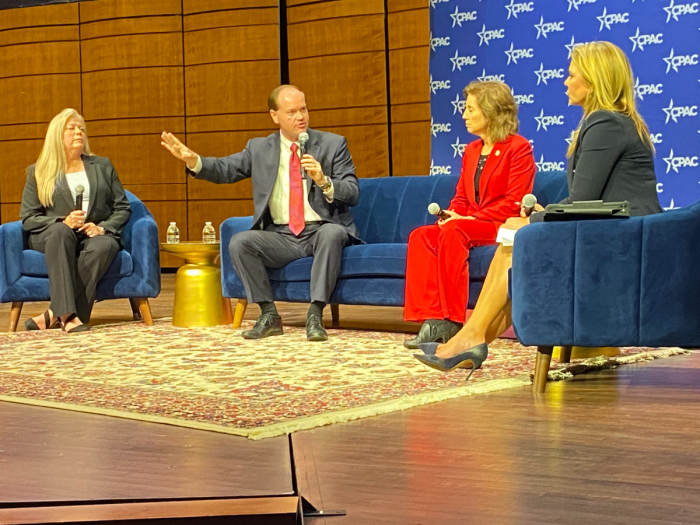
WASHINGTON — The Nigerian government is facing renewed allegations of complicity in the Christian persecution plaguing its country amid the Nigerian army’s publication of a social media post dismissing warnings about an impending attack.
The Conservative Political Action Conference held a special Summit on Ending Christian Persecution at the John F. Kennedy Center for the Performing Arts on Thursday.
One of the panel discussions focused on violence impacting Christian communities in Nigeria and what they say is the government’s failure to respond to it effectively. While there is the presence of Islamic extremist groups in Nigeria’s northeast, attacks on predominantly Christian communities in the country’s agricultural rich Middle Belt states are being committed by primarily radicalized Fulani herders in the Middle Belt states of the African nation.
As watchdog groups estimate that thousands have been killed in Nigeria each year for several years amid the rise of extremism, debate has been ongoing among experts and diplomats over the extent to which religion plays a role in the violence, with some saying it meets the standard for genocide and others taking the Nigerian government’s position that these attacks are decades-old farmer-herder clashes.
Sean Nelson, legal counsel with the nonprofit organization Alliance Defending Freedom International, told the audience about a pastor in the Plateau state who warned government officials about “Fulani militants who are amassing right near villages” in his area. He said the pastor sent a message to the Nigerian army and claimed that an attack was imminent.
“They’re about to attack, we know what’s going to happen,” Nelson cited the pastor as saying.
Nelson claimed that the Nigerian army “put up a statement saying that pastor was causing disunity [and] misinformation and we’re watching him.”
The Oct. 14 statement in question, available on the Nigerian army’s X account, condemned the warning as consistent with “a growing pattern of unsubstantiated claims by certain religious figures to whip sentiments in the Joint Operations Area (JOA).”
“The anonymity of the source and the sensational nature of the claim point to a coordinated narrative designed to erode public trust in security agencies. It is even more worrisome that some religious leaders, instead of promoting peace and community cooperation, appear to be leading a subtle campaign of misinformation against the security agencies working tirelessly to maintain order. This trend not only undermines public confidence but also jeopardizes ongoing peace-building efforts,” the statement added.
Shortly after the pastor warned the Nigerian army and they publicly rebuked his concerns, Nelson said more than a dozen Christians were killed. Following the attack, there was “no apology, no action taken, nothing” from the Nigerian army.
The advocacy group International Christian Concern provided additional details about the mass killing, which it characterized as “coordinated attacks on several Christian villages in Barkin Ladi Local Government Area (LGA) of Plateau state.”
According to ICC, eyewitnesses from the mission center in Rawuru reported that gunmen invaded their compound at night and opened fire on residents gathered for evening prayers.
“Two members of the mission center were killed on the spot, while several others managed to escape into the nearby bushes,” the ICC release stated. “The attackers later advanced toward Tatu village, where ten additional people were killed in what appeared to be a deliberate attempt to terrorize Christians. In the Lawuru community, located a few miles away, two more residents were shot dead, and their livestock was taken by the assailants.”
During their discussion, the panel repeatedly highlighted the need for the Trump administration to designate Nigeria as a country of particular concern. The CPC designation is reserved for the world’s worst violators of religious freedom and can often carry diplomatic consequences, such as sanctions.
While the Trump administration labeled Nigeria as a CPC towards the end of President Donald Trump’s first term, the Biden administration revoked that designation shortly after taking office in 2021.
Nelson elaborated on how the CPC designation could influence Nigeria to more effectively respond to the targeting of Christians, describing it as “absolutely vital because that’s what’s going to put pressure” on Nigeria.
“They value our economic relationship, they value the security assistance that we provide,” Nelson said.
“The government of Nigeria has mostly focused on terrorism in the Northeast, which is very important. They’ve not really been winning that battle recently,” Nelson said. “They focused not one iota on the Middle Belt. They haven’t focused that much on the northwest. And so we need to tell them, you have to put those resources. When you get those early warnings, you need to go out and you need to find the terrorists and you need to defeat them.”
The Trump administration has recently been pressured by a member of U.S. Congress and a coalition of leading Christian religious freedom advocates to designate Nigeria a CPC, “several years have seen a burgeoning of violent attacks specifically targeting rural Christians in the country’s Middle Belt, while the government in Abuja barely lifts a finger to protect them.”
Ryan Foley is a reporter for The Christian Post. He can be reached at: ryan.foley@christianpost.com






